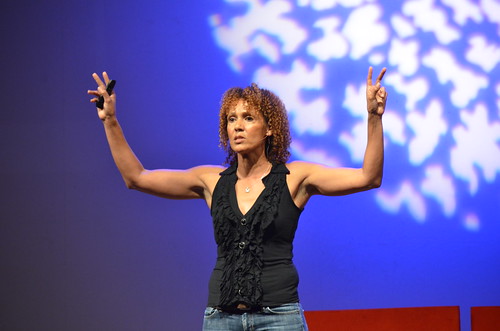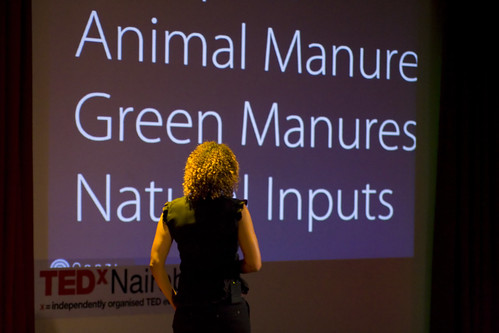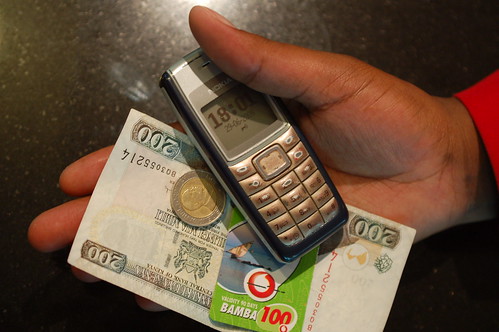Award-winning Kenyan agricultural entrepreneur Su Kahumbu (photo on Flickr by afromusing).
On Tue, 11 Dec 2012, Kenyan social entrepreneur Su Kahumbu gave ILRI’s fourth ‘livestock live talk’ seminar, titled ‘Livestock and mobile technology’, at the International Livestock Research Institute (ILRI), in Nairobi, Kenya.
Kahumbu founded Green Dreams Ltd and Green Dreams Tech Ltd companies, which are focused on creating solutions for small-scale organic farmers in Africa. She has 14 years experience across the whole of the organic value chains in Kenya, from production to consumption and policy to advocacy. Kahumbu is a TED Fellow and is spreading her passion through the TED network; her ambition is to help ‘Build a better Africa from the ground up’.
Kahumbu is also the creator of an Apps4Africa Award-winning app known as iCow, a mobile application officially launched in June 2011 that she developed to help small-scale dairy farmers track their cow’s fertility cycle. It prompts farmers on vital days of cow gestation period, helps farmers find the nearest vet and all service providers, collects and stores farmer milk and breeding records, and sends farmers best dairy practices.
A mother of three, Kahumbu started her presentation by confessing to her largely scientific audience that she knew little cows when she started and know little about technology . “What I feel I do know about is what smallholder farmers need to help them mitigate the big risks of farming. My presentation will take you through the development of iCow.
What keeps her up at night
‘There are a few things that keep me up at night. One billion people on the planet suffering from malnutrition. And climbing. Largely due to unsustainable agriculture and ecological practices. . . . We do produce enough food for the planet, but we only consume half of what we produce. Millions of tonnes are lost in post-harvest, transport, processing and retail.
‘That’s worrying. More worrying is that more than one in four Africans—218 million people—on this continent are suffering from undernourishment.
‘The current solutions I feel that we’ve been delivering to small-scale farmers and to farmers in general have been at the expense of our ecosystem and is resulting in dependence on very heavy, expensive inputs: fertilizers, adapted and modified seeds that generally the farmers cannot afford.
‘In working with farmers over the last few years, I’ve seen this continual vicious cycle, with farmers being pushed to adopt new technologies, and to spend more, and to get money from banks. And I don’t see this as sustainable, especially when the core problem is that we’re not focusing on the fertility of our soils.
‘On top of that, who is it that we call a farmer? Farmers in industrialized countries are mechanized, industiralized, subsidized, compared to farmers here who are, literally, unsupported, yet, in our case in Kenya, supply 80% of the national food. It’s quite shocking.
‘Farmers risks [here] are enormous. If I were to say to you, “Let’s all of us get out there and go get a job where we’re going to have weather on our doorsteps, poor storage, poor infrastructure, high inputs”, how many of us would actually say “That’s great, let’s go do it”? Yet we depend on these same smallholder farmers to feed us.
Going forward, one of the things I think we really need to focus on is what I’m largely doing with iCow, and that is focusing on reducing the risks of the smallholder farmer. . . .
It became quite evident that what farmers needed was knowledge, markets and finance. . . .
Mobiles in Kenya: A ‘huge, huge, huge opportunity’
‘We have today 80% mobile phone penetration across the country, with 100% penetration among 20 to 29 year olds. On the African continent, we have 700 million mobile phones using many mobile phone plans. That is a huge, huge, huge opportunity to get information out to farmers.
‘And that leads me to iCow. iCow is an agricultural information platform accessed primarily via mobile phones, although we do do some stuff on the web. You don’t have to have a smart phone. We started out using sms [short message service]. The objectives were to increase farmer productivity through increased knowledge.
The iCow ‘pipe’
‘I describe iCow as a pipe, with one end the farmers. . . . Farmers register their cow on the date the animal is served and we start to push sms’s to them along the gestation period of that animal, reminding the farmer when she’ll come into heat again. We continue to drip-feed information on best practices right up until the animal gives birth. If it’s a lactating animal, when tell them when and how to dry the cow off without it getting mastitis, etc.
‘To get a vet or AI, farmers simply send the word “vet” or “AI” plus the short code—the short code is 50-24—over one of the three largest networks in the country. When they send the word “vet”; they get a response asking them where they’re located, and they receive the telephone numbers and the names of the vets in their locality. Same with AI. This service is offered 24/7. The system is automated so they can receive the information whenever they like. Both these features are quite popular.
‘As we took the product to market, we had to build in a customer care centre . . . . We found that many farmers knowing that there is a voice at the end of the system helps them adopt new technologies.
‘As we started to roll out the platform, on 3 June 2011, . . . we had to build another feature quite quickly, and that is what we call Mashauri. That is where farmers register to receive three sms messages a week, at this point in time across the value proposition of the cow. And so they get information on feeding, on vaccinations, on calf care, etc. But they don’t have to have registered their cow.
‘Soon after that, farmers started saying “I want to buy a cow”, “Where do I get a heifer calf”. Or “I want to buy a dairy goat”. So we built a marketplace [called Soko]. Very, very easy. Just like Craig’sList [an online classified ad service in many cities and countries throughout the world], but on a mobile phone [rather than the internet]. Through a series of steps, a farmer posts what it is he wants to sell, and through a series a steps whoever is looking for that will simply get his telephone number. So if you’re selling a Toggenburg goat, you will put in “Toggenburg goat” and farmers looking for Toggenburg goats will get your number. . . .
‘As our database started to grow—today our database is 42,000 farmers—we put on a feature called Sauti. Again, farmers register for it, and if anything critical comes up, we can send them that information on their authority. . . .
‘And then Videos. An sms is only 160 characters long; you cannot put too much information in an sms. So we’ve put up 2-3-minute videos on our website and we’ve shown farmers who are registered what to do when they get to the nearest cybercafe; we send them short links where they’ll find short videos about the information they’re looking for. . . .
Su Kahumbu is a TEDX Fellow (picture on Flickr by Wa-J, Joshua Wanyama).
Both ends of the iCow pipe are working
‘What we found was that as we were dealing with farmers, other people started getting interested—the other end of the pipe—the NGOs, government, practitioners on the ground, etc. We started getting requests from them to help reach farmers, in some cases just to do surveys, so that they could see very quickly how their programs were impacting on the ground. So both ends of the pipe are now actually working.
Virtual vets
‘We also found that sometimes farmers were requesting things from us that we couldn’t answer. And they weren’t very happy about the vets on the ground. So we thought, “What can we do about that?”. So we started looking at using vets in the virtual sense.
‘We formed a very simple system using Google Docs. We upload any question that we can’t deal with or that the farmer didn’t get an answer to on the ground to a few vets, and the vets send the messages among themselves and come up with the best answer that they send to us, that we then forward to the farmer.
‘It’s really interesting because we have vets in Uganda answering questions from farmers in Kenya. And we’ve had requests from Senegal, where they had only four vets on the ground, asking whether they can use the same system.
‘Long-term, it makes it very interesting how expertise and skills using the cloud can actually network and reach out across borders quite easily, if it is planned right and there is political support.
iCow snapshot
- 42,000 farmers in the iCow database.
- iCow is becoming an educational tool.
- Profile of iCow farmer: 1–2 acres land, 2–3 cows, 20% women.
- After 7 months, iCow farmers are getting 2–3 extra litres of milk per cow per day.
- Other gains:
Reduced calf mortality
Fee conservation
Fodder production
Reduced veterinary costs
Healthier animals
Amazing maize story
‘An interesting thing happened on April 10th, when the first information started coming out about maize disease in the country. Farmers were up in arms—they weren’t getting any responses from government. They wanted to know “What is the solution? What can we do?” Government was being quite, everybody was being quiet, because nobody knew what to do.
‘But we heard from some farmers on Facebook that one of the seed multiplication centres of KARI [the Kenya Agricultural Research Institute] had some good-quality disease-free seed. So we took that information, put it on our system and sent it to 11,000 farmers, using iCow. And literally, within minutes, the phone in that centre was ringing off the hook and farmers started to buy the seed using MPESA [Kenyan mobile phone financial service] and having it sent by matatu [Kenyan taxi]. Within three days, there was no seed left in that centre.
‘We called KARI and asked “What was the reaction?”. They said, “How did that happen? We now have to bulk up three times as much seed as we thought we needed. They expected to sell the seed over a six-month period and they sold it, literally, within days. So again, using technology to make those links, make those connections work. It was 6 weeks later that the seed problem hit the headlines in Kenya. I was so happy that at least we could do something that much earlier for farmers.
East Coast fever vaccine: 99% of Kenyan farmers want it
‘Many of you know, especially here in ILRI, that the ECF [East Coast fever] vaccination has just been launched in Kitale. We worked with GALVmed to do a survey using iCow to find out what farmers felt about the vaccination. And 99% of those surveyed said they want the vaccination and said “When can we have it? Let us know straight away.”
‘We were invited to the launch and I’m happy to say that this is going to be a huge thing for the farmers in Africa. This is an awful disease killing up to 1.1. million livestock a year on the continent.
‘That brings me to the end of my presentation.
What iCow is doing, I believe, is turning our farmers, our survivors, our people on the land, whatever you want to call them, into knowledgable farmers. We currently have farmers in 42 different counties; we have 42,000 farmers in our database using different features of the platform.
Thank you.’
Watch and listen to this Part 1 of ILRI’s ‘livestock live talk’ seminar here: https://www.ilri.org/livestream. Part 2 of this talk, in which Kahumbu tells us more about herself and answer questions, will be posted here soon.
Or view her slide presentation here: Livestock and mobile technology, presentation by Su Kahumbu at ILRI on 11 Dec 2012.
You can contact Su Kahumbu at su [at] greendreams.co.ke
‘Livestock live talks’ is a seminar series at ILRI that aims to address livestock-related issues, mobilize external as well as in-house expertise and audiences and engage the livestock community around interdisciplinary conversations that ask hard questions and seek to refine current research concepts and practices.
All ILRI staff, partners and donors, and interested outsiders are invited. Those non-staff who would want to come, please contact Angeline Nekesa at a.nekesa[at]cgiar.org (or via ILRI switchboard 020 422 3000) to let her know. If you would like to give one of these seminars, or have someone you would like to recommend, please contact Silvia Silvestri at s.silvestri[at]cgiar.org (or via ILRI switchboard 020 422 3000).



